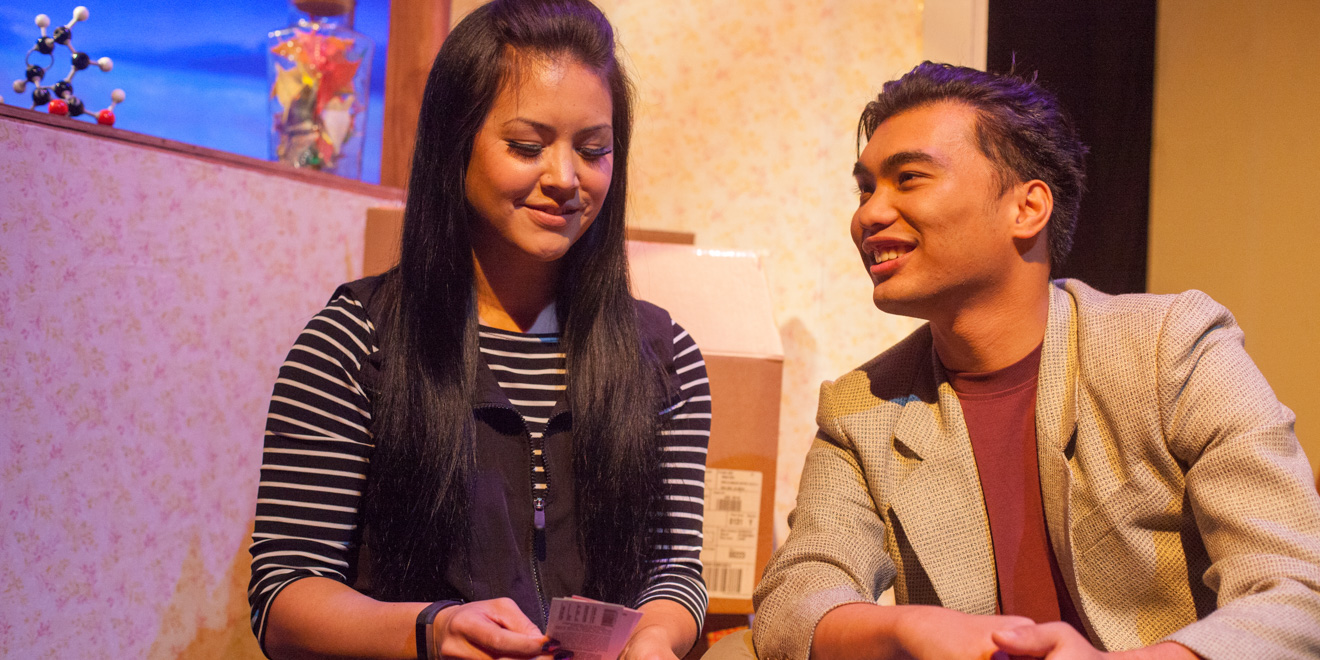The Pear Theatre’s production of Michael Golamco’s “Cowboy versus Samurai” (directed Jeffrey Lo) is packed with jokes and heart, even with a difficult script. An adaptation of Cyrano de Bergerac, Michael Golamco’s “Cowboy versus Samurai” follows the Korean American teaser Travis (Lorenz Angelo Gonzales) as he helps the good-natured yet slightly dim-witted white teacher Del (Drew Reitz) pursue the new Asian American teacher Veronica (Heather Mae Steffen) under the guise of Del as an All-American cowboy. Travis is accompanied by Chester (Chuck Lacson), who pines over Veronica and expresses irrationally militant views. All in all, the premise makes for a farcical adventure, but outside of Chuck’s character, the script does not leave much room for this.
Originally produced in 2005, “Cowboy versus Samurai” unfortunately feels rather dated as a play itself. While it brands itself as a sociopolitical exploration of the Asian American experience in the Midwest, it mostly presents itself as a one-dimensional look at race and class in rural Wyoming — arguably Midwest, yes, but nonetheless distinct from the experience of, say, people from the eastern part of the suburban Midwest. While humorous and well-executed, the character of Chuck is an over-accentuated presentation of Asian American male desexualization, accompanied by a significant number of questionable lines from Chuck and Veronica over what Asian Americans think of themselves. The play might be attempting to push boundaries, but it lands only as a source of self-deprecating humor for a majority-white audience. This is no fault of this production itself, but attempts to remedy the script are exceedingly difficult.
Gonzales and Reitz have great chemistry in their dichotomous personalities, and Reitz puts forth an excellent performance as both Del and the imagined “cowboy” persona that Travis dreams up. Lo’s execution of the transitional elements in the small space worked well as no one ever broke character, although a mashup of contemporary hip-hop songs mixed with older tunes rendered itself somewhat distracting. The bare staging — including its utilization of two differently-sized desks effectively transformed the space from location to location but struggled with physical comedy as necessitated by the attempt at farce.
I struggled over the inclusion of many elements that could be seen as potentially controversial or not serving the play’s attempt at being progressive. Chester worships Bruce Lee and obsesses over Veronica’s beauty, while Veronica only dates white men out of habit and preference. In an attempt of self-reflection upon what may still be commonly seen in society today. Lo tries to tackle these issues by emphasizing Chester’s over-exaggerated physicality and Veronica’s aloofness over not only the Asian American Travis, but also her job. It does venture into dangerous territory, however, as it potentially perpetuates harmful stereotypes of Asian Americans that audience members might deem as normal versus an extreme version of forms of self-loathing that so many Asian Americans struggle with everyday. At times, I was slightly discomfited. The production doesn’t fix everything in the script, but Lo gets at the point, as seen by many of the audience reactions over inflammatory words and phrases — the discomfort is part of the remedy.
The Pear Theatre’s production of “Cowboy versus Samurai” may not be perfect, but so is the script — and without a clean script, a clean production is hard. Nevertheless, Jeffrey Lo brings forth an interesting look at one unit Asian American experience that leaves the audience desperate for the end to see if Travis will indeed unite with Veronica before she leaves forever.
Contact Olivia Popp at oliviapopp ‘at’ stanford.edu.
